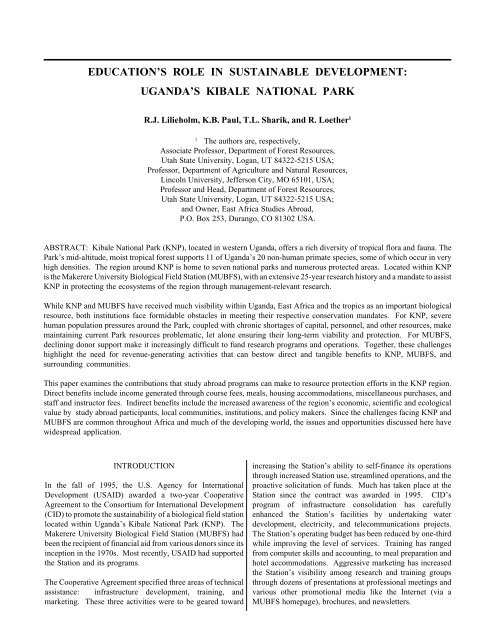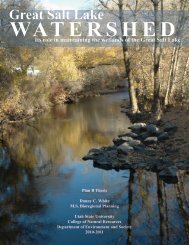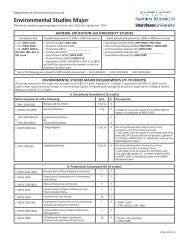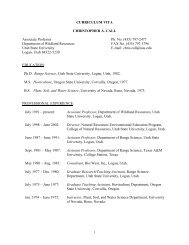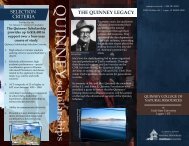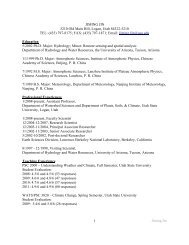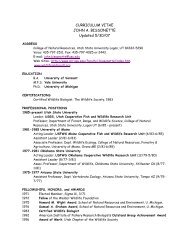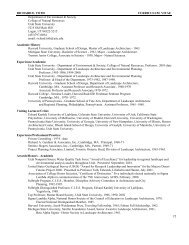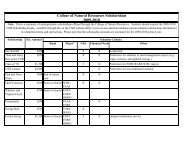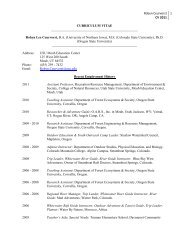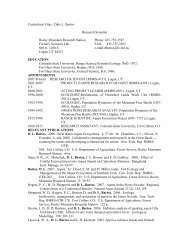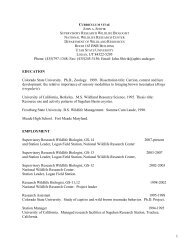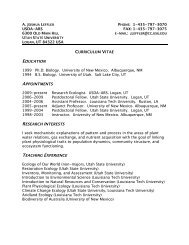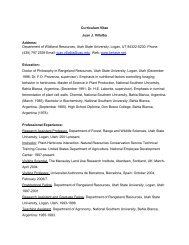University Education in Natural Resources - CNR Home - Utah State ...
University Education in Natural Resources - CNR Home - Utah State ...
University Education in Natural Resources - CNR Home - Utah State ...
Create successful ePaper yourself
Turn your PDF publications into a flip-book with our unique Google optimized e-Paper software.
EDUCATION’S ROLE IN SUSTAINABLE DEVELOPMENT:<br />
UGANDA’S KIBALE NATIONAL PARK<br />
R.J. Lilieholm, K.B. Paul, T.L. Sharik, and R. Loether 1<br />
1<br />
The authors are, respectively,<br />
Associate Professor, Department of Forest <strong>Resources</strong>,<br />
<strong>Utah</strong> <strong>State</strong> <strong>University</strong>, Logan, UT 84322-5215 USA;<br />
Professor, Department of Agriculture and <strong>Natural</strong> <strong>Resources</strong>,<br />
L<strong>in</strong>coln <strong>University</strong>, Jefferson City, MO 65101, USA;<br />
Professor and Head, Department of Forest <strong>Resources</strong>,<br />
<strong>Utah</strong> <strong>State</strong> <strong>University</strong>, Logan, UT 84322-5215 USA;<br />
and Owner, East Africa Studies Abroad,<br />
P.O. Box 253, Durango, CO 81302 USA.<br />
ABSTRACT: Kibale National Park (KNP), located <strong>in</strong> western Uganda, offers a rich diversity of tropical flora and fauna. The<br />
Park’s mid-altitude, moist tropical forest supports 11 of Uganda’s 20 non-human primate species, some of which occur <strong>in</strong> very<br />
high densities. The region around KNP is home to seven national parks and numerous protected areas. Located with<strong>in</strong> KNP<br />
is the Makerere <strong>University</strong> Biological Field Station (MUBFS), with an extensive 25-year research history and a mandate to assist<br />
KNP <strong>in</strong> protect<strong>in</strong>g the ecosystems of the region through management-relevant research.<br />
While KNP and MUBFS have received much visibility with<strong>in</strong> Uganda, East Africa and the tropics as an important biological<br />
resource, both <strong>in</strong>stitutions face formidable obstacles <strong>in</strong> meet<strong>in</strong>g their respective conservation mandates. For KNP, severe<br />
human population pressures around the Park, coupled with chronic shortages of capital, personnel, and other resources, make<br />
ma<strong>in</strong>ta<strong>in</strong><strong>in</strong>g current Park resources problematic, let alone ensur<strong>in</strong>g their long-term viability and protection. For MUBFS,<br />
decl<strong>in</strong><strong>in</strong>g donor support make it <strong>in</strong>creas<strong>in</strong>gly difficult to fund research programs and operations. Together, these challenges<br />
highlight the need for revenue-generat<strong>in</strong>g activities that can bestow direct and tangible benefits to KNP, MUBFS, and<br />
surround<strong>in</strong>g communities.<br />
This paper exam<strong>in</strong>es the contributions that study abroad programs can make to resource protection efforts <strong>in</strong> the KNP region.<br />
Direct benefits <strong>in</strong>clude <strong>in</strong>come generated through course fees, meals, hous<strong>in</strong>g accommodations, miscellaneous purchases, and<br />
staff and <strong>in</strong>structor fees. Indirect benefits <strong>in</strong>clude the <strong>in</strong>creased awareness of the region’s economic, scientific and ecological<br />
value by study abroad participants, local communities, <strong>in</strong>stitutions, and policy makers. S<strong>in</strong>ce the challenges fac<strong>in</strong>g KNP and<br />
MUBFS are common throughout Africa and much of the develop<strong>in</strong>g world, the issues and opportunities discussed here have<br />
widespread application.<br />
INTRODUCTION<br />
In the fall of 1995, the U.S. Agency for International<br />
Development (USAID) awarded a two-year Cooperative<br />
Agreement to the Consortium for International Development<br />
(CID) to promote the susta<strong>in</strong>ability of a biological field station<br />
located with<strong>in</strong> Uganda’s Kibale National Park (KNP). The<br />
Makerere <strong>University</strong> Biological Field Station (MUBFS) had<br />
been the recipient of f<strong>in</strong>ancial aid from various donors s<strong>in</strong>ce its<br />
<strong>in</strong>ception <strong>in</strong> the 1970s. Most recently, USAID had supported<br />
the Station and its programs.<br />
The Cooperative Agreement specified three areas of technical<br />
assistance: <strong>in</strong>frastructure development, tra<strong>in</strong><strong>in</strong>g, and<br />
market<strong>in</strong>g. These three activities were to be geared toward<br />
<strong>in</strong>creas<strong>in</strong>g the Station’s ability to self-f<strong>in</strong>ance its operations<br />
through <strong>in</strong>creased Station use, streaml<strong>in</strong>ed operations, and the<br />
proactive solicitation of funds. Much has taken place at the<br />
Station s<strong>in</strong>ce the contract was awarded <strong>in</strong> 1995. CID’s<br />
program of <strong>in</strong>frastructure consolidation has carefully<br />
enhanced the Station’s facilities by undertak<strong>in</strong>g water<br />
development, electricity, and telecommunications projects.<br />
The Station’s operat<strong>in</strong>g budget has been reduced by one-third<br />
while improv<strong>in</strong>g the level of services. Tra<strong>in</strong><strong>in</strong>g has ranged<br />
from computer skills and account<strong>in</strong>g, to meal preparation and<br />
hotel accommodations. Aggressive market<strong>in</strong>g has <strong>in</strong>creased<br />
the Station’s visibility among research and tra<strong>in</strong><strong>in</strong>g groups<br />
through dozens of presentations at professional meet<strong>in</strong>gs and<br />
various other promotional media like the Internet (via a<br />
MUBFS homepage), brochures, and newsletters.


